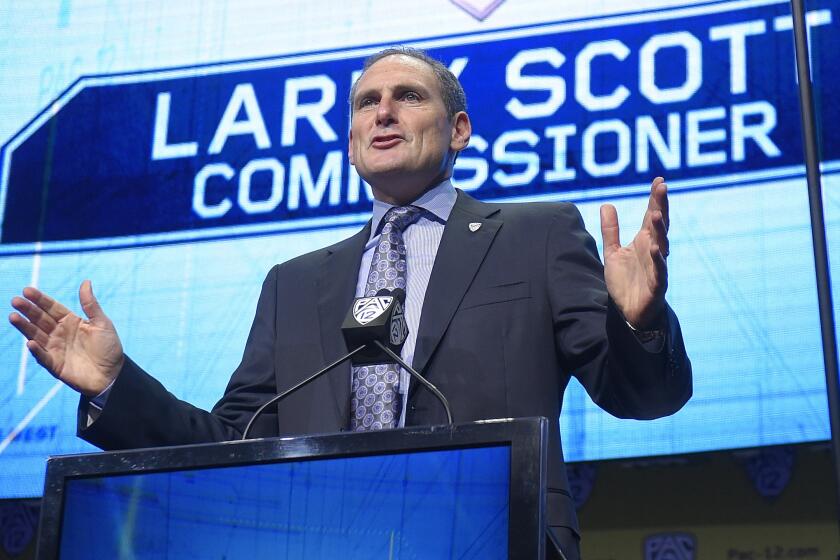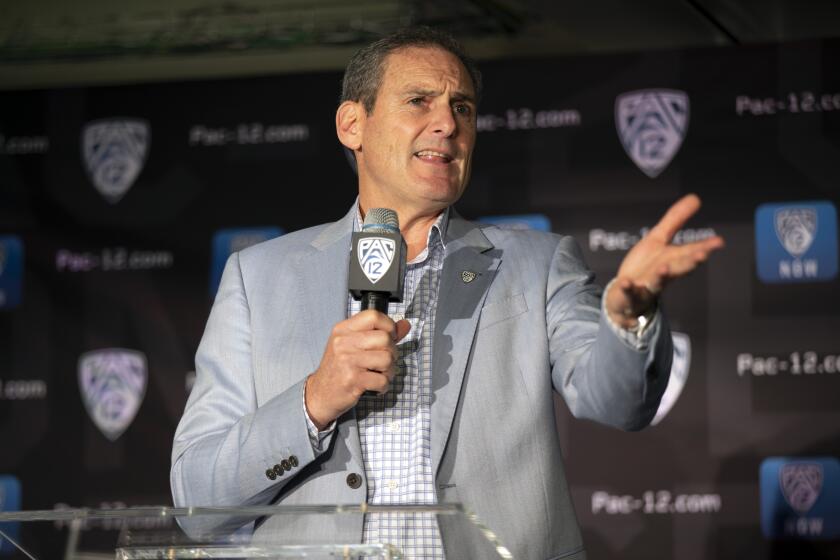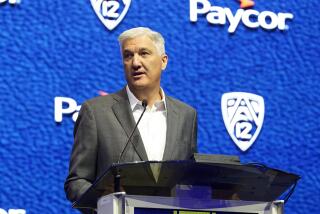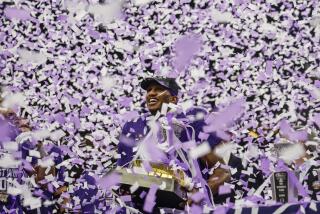Pac-12 hires ‘outsider’ George Kliavkoff as its new commissioner
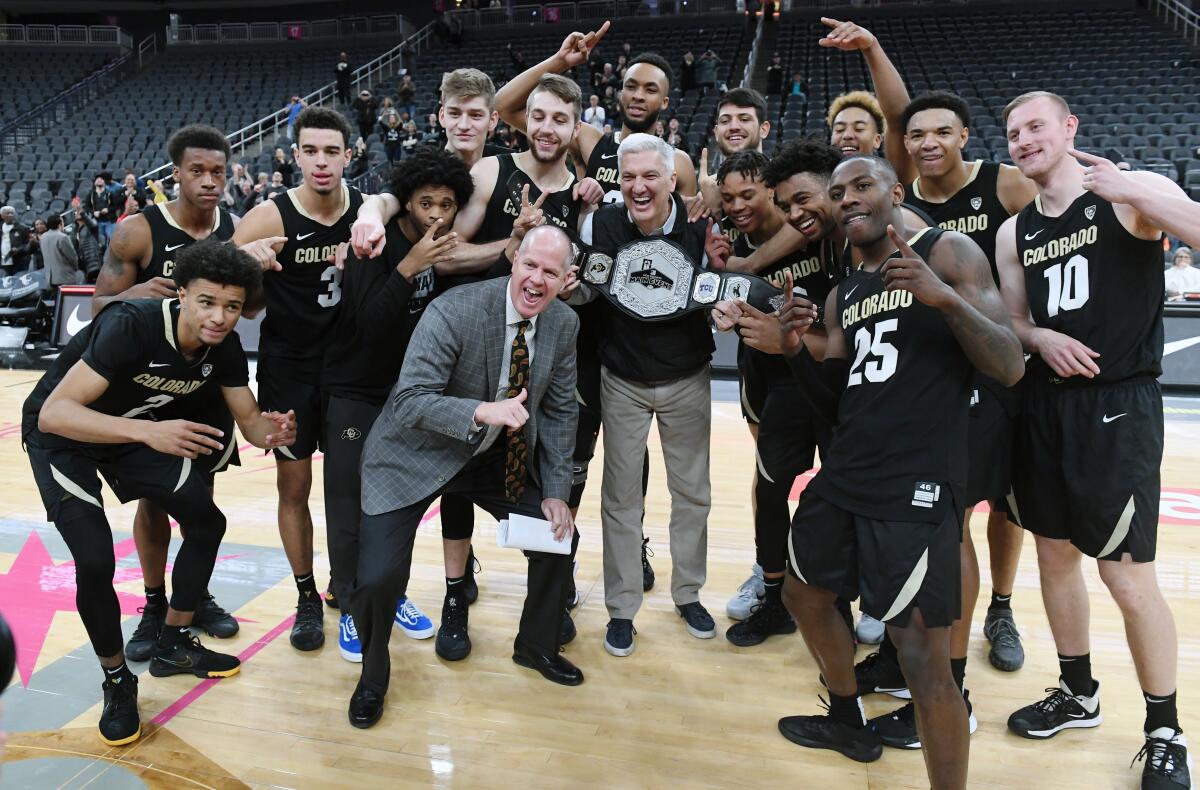
Desperate for a different direction after years spent falling behind its Power Five peers, the Pac-12 is placing its bet on an outsider with no college sports experience to save the struggling conference.
The Pac-12 has hired George Kliavkoff, president of entertainment and sports at MGM Resorts International, as the conference’s new chief executive. He replaces outgoing commissioner Larry Scott, whose hiring also once was sold as an innovative move with an eye on the future of college athletics.
The landscape has changed significantly since, leaving the Pac-12 at “a critical crossroads,” Oregon president Michael Schill said Thursday. It was with those stakes in mind that the Pac-12 again set their aim outside the box, choosing Kliavkoff, whom Schill hailed as “a forward thinker” and “the new prototype for a sports commissioner.”
Until July, when Kliavkoff takes the baton from his embattled predecessor and begins a five-year contract, his sole exposure to college athletics will have been his tenure as a collegiate rower at Boston University. At the start of his introductory news conference, Kliavkoff, 54, joked about his anonymity.
“I understand I wasn’t on any of the media’s shortlists for this role,” he said.
But an inconspicuous four-week search that Schill, the search committee chair, said included 200 applicants settled unexpectedly on the longtime media executive, whose resume includes stops at Major League Baseball Advanced Media, NBC Universal, Hearst, and Hulu.
Kliavkoff is set to take the reins of a conference in steep decline and approaching a juncture to its future, with its football programs struggling and media rights negotiations looming ahead of 2023-24.
Larry Scott and the Pac-12 announced they are parting ways at the end of June, ending the commissioner’s turbulent 11-year run.
The new commissioner wasted no time Thursday in demonstrating an understanding of those shortcomings.
“I want to be clear,” he said. “We know where the bread is buttered. We’re focused on revenue sports and winning in men’s basketball and football.”
Before even taking his first question, Kliavkoff made clear two paths he plans to pursue to make that happen.
“I want to go on the record that the Pac-12 is in favor of the expansion of the College Football Playoffs ... and the implementation of consistent guidelines for name, image and likeness,” he said. “We think that both CFP expansion and NIL [Name, Image and Likeness] legislation are good for college sports fans, good for our student athletes and can be a significant competitive advantage for the Pac-12.”
The conference can take all the advantages it can get after four years of being held out of the College Football Playoff. Since the four-team format began following the 2014 season, the Pac-12 has sent just two teams to the playoff, Oregon in that inaugural season and Washington in 2016-17.
Unlike his predecessor, who was reluctant to openly advocate for expansion, Kliavkoff argued that the current playoff format is “not good for college football,” noting how 20 of the 28 playoff bids have been divided among four schools. However, he declined to offer specifics of what format he prefers.
“Everything is up for review, to make us more competitive,” Kliavkoff said. “I want to be clear about that.”
The playoff is hardly the only inequity Kliavkoff will have to confront as commissioner. He’ll soon be thrust into negotiations for the Pac-12’s lagging media rights deal, which was once the most lucrative college sports TV contract in history.
As the Big Ten distributed $55 million to its member schools and the Southeastern Conference sent out $45 million, the Pac-12 distributed $32 million after the 2018-19 season, leaving its member institutions at a major financial disadvantage.
Hiring a media executive certainly makes a clear statement ahead of those negotiations. But it’s also sure to inspire some skepticism among those clamoring for a commissioner with deep campus ties — a candidate, perhaps, such as Oliver Luck, the former West Virginia athletic director and XFL commissioner who was rumored to be a finalist for the job.
Instead, the decision to hire an outsider with an innovative, media-centric vision inevitably echoes the last time the conference hired a commissioner in 2009. Scott was the chairman and CEO of the Women’s Tennis Assn. when the Pac-12 plucked him away as its commissioner.
His turbulent 12-year tenure began with conference expansion and a record-setting 12-year, $3 billion media rights deal with ESPN and FOX. But the gap closed quickly on the conference and the Pac-12 Networks proved to be a failure, never reaching the distribution Scott had promised.
In an exclusive interview with the Times, Larry Scott, the outgoing Pac-12 commissioner, says it’s time to show ‘grace’ to the selection committee.
Those issues only compounded in recent years, just as Scott’s salary rose to more than $5 million, far outpacing most other conference commissioners. In January, Scott announced he would step down.
His successor, while similarly inexperienced, struck a different chord during his introduction, offering a frank assessment of where the conference stood. He admitted that the Pac-12 Network has “far fewer subscribers than any other comparable network, and we have to fix that.”
He declared that the Pac-12’s “greatest weakness” is “the number of years it’s been since we won a football or men’s basketball championship.” He even suggested the conference could embrace sports betting.
When pressed on his inexperience, Kliavkoff teased the possibility of hiring an on-campus liaison who could help rebuild a fraught relationship between the conference and its 12 campuses.
Otherwise, he said he thinks his perspective as an outsider should only help save the conference.
“For me,” Kliefkoff said, “not coming in with preconceived notions about how things should operate has always played to my advantage.”
More to Read
Go beyond the scoreboard
Get the latest on L.A.'s teams in the daily Sports Report newsletter.
You may occasionally receive promotional content from the Los Angeles Times.

